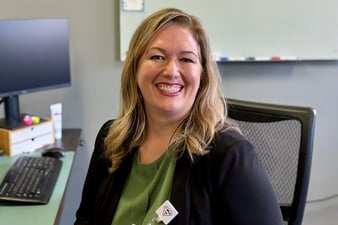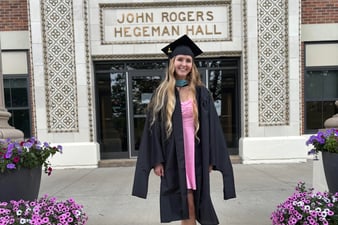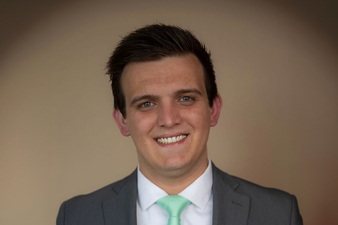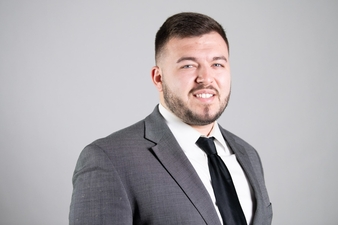Since graduating from Keuka College, Apryl Poch ’06 has built an impressive resume, even traveling to Australia this summer to accept an award from the International Academy for Research in Learning Disabilities. She's shown overlooking Pittsburgh, home of her new employer: Duquesne University.
Fast Facts
Name: Apryl Poch
Class: 2006
Major: BA in Adolescent/Special Education and English
Additional academic degrees:
- MA in English and Graduate Certificate in Gender and Women’s Studies – 2007 – University of Rochester
- Graduate Certificate in Autism Education – 2010 – National University
- Ph.D. in Special Education – 2016 – University of Missouri
Current position: Assistant Professor of Special Education, Duquesne University
Where did you grow up? East Otto, New York
Where do you live now? Wexford, Pennsylvania
Professional accolades:
- I traveled to Brisbane, Queensland, Australia in early July to accept the Marjorie Montague Outstanding Dissertation Award presented by the International Academy for Research in Learning Disabilities.
- Earlier this year, I was selected as a core researcher on the “Writing Through the Lifespan: A Longitudinal Study of Writing Experiences and Development” project, an international collaboration of writing researchers from different disciplines interested in understanding writing development.
Tell us about your current position:
I am an Assistant Professor of Special Education at Duquesne University in Pittsburgh, Pennsylvania. My responsibilities fall across three domains:
Teaching – I teach both undergraduate and graduate level classes. This fall, I am teaching two sections of an undergraduate class (titled Educated Citizenry: Academic Adaptations) focused on introductory aspects of special education and collaboration between both general and special education providers. I am also teaching a graduate-level course focused on assessment (titled Systematic Observation and Assessment).
Research – My research is focused on understanding the structural relations of the component skills of adolescent writing. Specifically, I am interested in evaluating theoretical models of writing and examining how variables such as student self-efficacy, motivation, and identity as a writer mediate the components of the Simple View of Writing (transcription, self-regulatory executive functions, text generation, and memory). I am also interested in pre- and in-service special educators’ theoretical orientations regarding teaching writing to students with disabilities.
Service – I engage in service to the department, university, community, and the field. A few of my service activities include acting as a reviewer for journals (Teaching Exceptional Children and Assessment for Effective Intervention) and reviewing conference proposals (for the Division for Learning Disabilities, the Council for Exceptional Children and the Council for Learning Disabilities).
What is the most rewarding aspect of your current job?
(A) being able to conduct research in schools where I work with students and teachers, and (B) working with students who are passionate about their emerging presence as classroom teachers.
What is the most challenging aspect of your current job?
Balancing my love of research and my love of teaching. Both require extensive time for thorough development and attention to detail.
How did the Keuka College experience prepare you for your current responsibilities?
The Keuka experience provided me with the sense of challenge that I thrive on, and only fostered my passion for learning. I love learning and the opportunity to expand my repertoire of understanding. Today, as I think about designing learning tasks for pre-service teachers, I often find myself reflecting on my student teaching experiences at Naples High School and Penn Yan Middle School, and the structure of the classes I took while at Keuka.
How has your Keuka College degree helped you advance in your career?
My Keuka College degree was my initial stepping stone for later, more intense study in English and special education. My degree also helped foster my critical analysis skills, which aided my ability to effectively identify and individualize student learning needs, and today helps guide my research.
Why did you decide to attend Keuka College?
I graduated from a small, rural school district in western New York. When I looked at colleges, I wanted to find a school that would continue to allow me to build a relationship with my instructors and be more than a number in the classroom. Keuka also had a beautiful, tranquil location on the shores of Keuka Lake, and outstanding programs.
What surprised you the most about the Keuka College experience?
Looking back after 11 years, I think what surprises me the most about the Keuka College experience is the number of ways in which Keuka would remain an aspect of so many functions of my life – from friendships, to my classroom, and my teaching, to name but a few – and that I would be blessed to still be connected to so many amazing people.
Do you maintain any connection with the College or former classmates?
Some of my best friends are the result of my years at Keuka. Even though our lives have all taken us in various directions, we still maintain communications – sometimes on a weekly basis! Moreover, the relationship I formed with my host teacher, Beth Muller, from Penn Yan Middle School, during my student teaching experience has resulted in a strong and continually rewarding friendship. Facebook has also allowed me to reconnect with both friends and former professors.
Were there specific mentors who were instrumental in your education?
The faculty that I worked with at Keuka was amazing and I have enjoyed reconnecting with many of them. Professor Amanda Harris was my advisor. Dr. Anne Weed has been an amazing inspiration and mentor, even after I graduated. It has been a blessing to reconnect with Dr. Cindy Shepardson. And Dr. Andy Beigel served as chair of my honors project during my senior year. In one of our meetings, Dr. Beigel said that he could see it then, the placard that read “Dr. Poch.” Of course, at the time, I told him I just wanted my own classroom of students. Though, in time, I really wanted and hoped to pursue a doctoral degree; I just knew there were a series of steps/tasks that needed to be accomplished before I got to that point, and that included being the classroom teacher I had studied to become! I think of this exchange with him a lot since I graduated with my Ph.D. and now as I begin my first tenure-track position in higher education.
What obstacles have you had to overcome?
Despite my recent successes, the road to my current position has not always been smooth. There have been numerous applications that were made for pursuing both master- and doctoral-level course work, teaching positions in public schools, and faculty positions in higher education that resulted in the unfortunate news that I had not been selected for entrance into a program or selected for the coveted position. Though it can indeed be difficult to put yourself out there and pursue what you are interested in, I want others to know that dedication and persistence do pay off. In the end, there will emerge that one letter in which an employer has been willing to take a chance, and it is those opportunities that have opened doors for me and provided me with an amazing network of support and new friendship.
What are your plans for the future?
I plan on remaining in higher education, continuing my work in special education, and supporting the needs of adolescent struggling writers and writers with disabilities. I am hopeful that I will begin to foster collaborative relations with local school districts and that I will begin securing federal monies for supporting my research activities.













